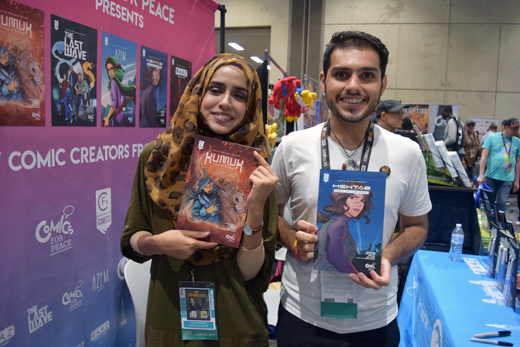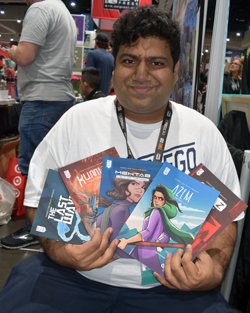
By Donald H. Harrison


SAN DIEGO – Walking through the exhibit hall at Comic-Con, I heard someone ask, “Would you like some free comic books for peace?” and when I turned, there was a smiling young woman wearing a hijab. Of course, I was interested right away. Could they mean peace between Arabs and Israelis, or Jews and the greater Muslim world, I speculated hopefully.
As it turned out, the young men and women from Pakistan who were staffing the booth were students artists and writers focused on ending the divisions, warfare, and hatreds that have riven their own country for generations.
Each year 20 students from universities all over Pakistan are chosen by the Comics for Peace organization to write and draw stories aimed at resisting terrorist organizations, and promoting peace through tolerance, understanding, and diversity.
The heroes of the comics created by the students sometimes are women, sometimes transgender persons, and sometimes magical beings with an array of super-powers. The time frames for the stories may be in the past, present or future
Typically, these heroes struggle against some dark powers who want to impose their will on everyone else in the country, and will stop at nothing – not murder, nor kidnapping, nor brainwashing techniques – to get their way.
Syed Mustafa Hasnain, director of CFX comics, was the editor of five comics being given away at the Comic-Con convention, all of them conceptualized and drawn by university students who live in parts of Pakistan that struggle with extremism.
He said “extremism in the last so many years has taken 20,000 lives” in Pakistan, and “we want to protect the next generation. Through stories they can be influenced in such a way as to be moved toward positive things.”
Hasnain, who grew up in Lahore, used to help his mother’s business distribute books and comic books to schools. “At one point, I noticed how the kids went for comic books, even though they didn’t read English. They would be excited about these books, and they would make up stories” to go with the pictures.
“It is an amazing medium,” he said.
Since the start up of CFX comics in 2014, the company has been distributing them in schools and universities around the country in an effort to promote peace.
Picturing women and members of minority communities as their heroes, the five comic books distributed at Comic-Con were intended “to show the face of multi-ethnic Pakistan,” said Hasnain.
He said he hoped the comic books would help change the image of Pakistan in the United States, which he said, seems to be that of “angry men.”
“Pakistan is much different from that,” Hanain said. “There are progressive men and women who believe in living in an integrated society in harmony with other people.”
As the comic books do not oppose any present-day group by name, only perhaps by analogy, they have drawn positive support, with only a few “minor incidents” of opposition to their message, said Hasnain, who writes comic books himself, but has been serving as an editor for the student efforts.
In alphabetical order, the five comic books – each intended as a first installment in a serialized story – were titled Azem: The Pact; Kunnuk: Picking up the Pieces; Mehtab: Light of the Moon; Raaz: Everyone Has a Secret; and The Last Wave.
On the cover of each comic book are the names of four members of a creative team, along with a credit to “their mentor” Joshua Dysart, a graphic novelist whose books have reached the New York Times best seller list.
*
Harrison is editor of San Diego Jewish World. He may be contacted via donald.harrison@sdjewishworld.com